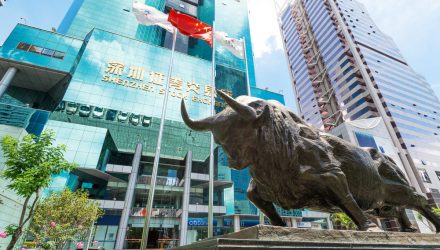Amid growing concerns that China’s economy is rapidly softening, the MSCI China Index slipped 5.50% last week. Predictably, that decline sparked similar results for various Chinese stocks and exchange traded funds, likely spooking some investors in the process.
Undoubtedly, Chinese stocks have been a frustrating proposition for investors since the start of the coronavirus pandemic. More recently, some market observers pontificated that the current state of affairs in Chinese markets and the economy is reminiscent of Japan in the early 1990s when deflation gripped the previously hot economy.
Fortunately, there’s a case against that theory, a valid one at that, and one that could open the door to opportunity with ETFs such as the WisdomTree China ex-State-Owned Enterprises Fund (CXSE).
As its name implies, the $614.59 million CXSE avoids companies in which Beijing is the dominant shareholder. Those lumbering firms already have lower growth prospects and could be the very companies most susceptible to a prolonged deflationary environment. That scenario probably won’t come to pass, but CXSE could still be one of the preferred ETF ideas for investors looking to position for a rebound by Chinese stocks.
CXSE Could Be a Compelling Rebound Idea
One point in CXSE’s favor is that some experts believe the China today/Japan 1990s comparison is a stretch.
“For context, China compares better with the Japan of the 1990s in the following four aspects. First, asset prices in China have not run up as much,” notes Chetan Ahya, Morgan Stanley’s Chief Asia Economist.” Second, per capita incomes are still lower in China, implying a higher potential growth runway. Third, unlike Japan, China has not experienced a big currency appreciation shock.”
Another point that could bode well for CXSE is monetary policy. As in the Peoples Bank of China is unlikely to repeat the missteps of the Federal Reserve leading up to the Great Depression and those of the Bank of Japan in the early 1990s.
“In this context, while China’s real interest rates are below real GDP growth currently, we still see the risk that policymakers will not take up reflationary policies to sustain the rates minus growth gap, which keeps the risk of China falling into debt deflation loop alive,” adds Ahya.
Central bank policy is vital in the CXSE discussion because the WisdomTree ETF allocates 35.57% of its weight to consumer discretionary stocks – by far its largest sector allocation. With China wanting to drive more domestic consumption, it’s unlikely the Peoples Bank will take action that could bring long-term harm to that objective.
For more news, information, and analysis, visit the Modern Alpha Channel.








